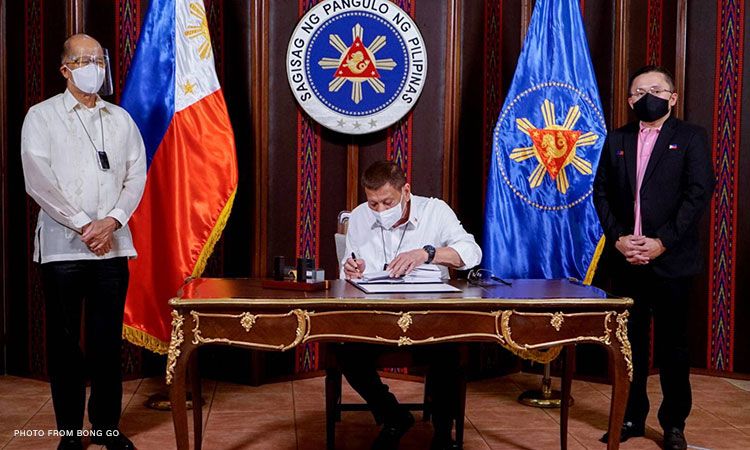President Rodrigo Duterte has signed into law the Bayanihan to Recover as One Act or Republic Act 11494, also popularly referred as ‘Bayanihan 2,’ which provides for P 165.5 billion pesos for pandemic response and recovery.
Senator Christopher “Bong” Go announced the signing on September 11.
The measure was ratified by the Senate soon after Duterte pushed for it in his State of the Nation Address (SONA), providing P 140 billion for recovery funds. The House of Representatives passed their version a week later, allotting P162 billion.
The measure was expected to have been discussed earlier, but the Lower House tackled the ASB-CBN franchise and then rejected it on July 10 after 13 hearings. The Senate who was already starting to tackle Bayanihan 2 was waiting for the executive branch to declare it as a priority bill but didn’t, and then the Congress adjourned and then resumed for the SONA.
Presidential Spokesperson Harry Roque also confirmed the signing of the law.
“We consider the Bayanihan II crucial in our efforts to gradually re-open the economy, support businesses and revitalize growth as we make our country resilient to COVID-19,” said Roque in a statement.
From the P 165.5 billion in Bayanihan 2 funds, P140 billion worth are for regular appropriations and an additional standby fund of P25.5 billion.
- P 3 billion for the Department of Health (DOH) for additional face masks, personal protective equipment, shoe covers, and face shields, alongside
- P 13.5 billion for the DOH for emergency employment and compensation of health workers
- P 4.5 billion for the construction of temporary isolation and quarantine facilities as well as the expansion of existing public hospitals
- P 4.5 billion for the Department of National Defense to cover expenses in isolating and treating returning overseas Filipino workers who test positive for COVID-19
- P 820 million fund is given to the Department of Foreign Affairs for repatriation efforts
- P 13 billion will be used to aid displaced workers through cash-for-work and other forms of assistance such as but not limited to Department of Labor and Employment (DOLE) TUPAD, CAMP one-time cash aid programs in Bayanihan 1
- P 6 billion will be given to the Department of Social Welfare and Development for cash assistance in areas under lockdown
- P 5 billion will be used to hire and train some 50,000 contact tracers under the Department of Local and Interior Government
- P 10 billion fund will be on standby for COVID-19 testing and purchase of COVID-19 medicines and vaccines once they become available.
Other subsidies for other sectors include:
- P 39.4725 billion as capital infusion to government banks to allow them to extend more loans, especially to small firms – including P 5 billion for the credit guarantee program PhilGuarantee, P 18.4725 billion to support wholesale banking an equity infusion of the Land Bank of the Philippines for low interests loans for industries affected by the COVID-19 pandemic, while P 6 billion is allotted through the Development Bank of the Philippines for the same program; P 10 billion additional funding for the CARES program of the SBCorp for other lending programs as well as interest subsidy for MSMEs, cooperatives, hospitals, tourism industry, OFWs affected
- P 24 billion as assistance to farmers and the Plant, Plant, Plant initiative of the Department of Agriculture
- P 9.5 billion for the Department of Transportation to assist businesses critically affected by the pandemic – including P2.604 billion for critically impacted businesses in the transportation industry; P 5.580 billion for temporary livelihood to displaced workers in the industry; P 3 billion for public utility drivers; P 2.580 billion for drivers of other public utility vehicles; P 1.316 billion for accessible sidewalks, bike lanes, bike sharing and bike racks;
- P 4 billion for the tourism industry – including P 1 billion for the Tourism Road Infrastructure Program of the DPWH; P3 billion for DOLE cash-for-work program
- P 4 billion to the Department of Education for the implementation of blended learning
- P 3 billion for the development of smart campuses across the country
- P 2 billion subsidy for the payment of interest on local government loans from state-run banks
- P 1.5 billion assistance to local government units as part of the Local Government Support Fund
- P 1 billion for TESDA scholarships
- P 600 million as subsidies and allowances for public and private school students in elementary, high school and college
- P 300 million as subsidies and allowances to teaching and non-teaching personnel, and part-time faculty in state universities and colleges
- P 180 million as allowance for national athletes and coaches
- P 100 million to finance the training and subsidies for tourist guides
- P 15 million for UP Diliman’s Computational Research Laboratory
- P 10 million research fund of the Health Technology Assessment Council
- P 5 million for the computer-based licensure of the Philippine Red Cross.
Sources of funding include the 2020 budget, the savings pooled for the national health emergency declaration due to COVID-19, new and excess revenues, amounts from government corporations, amounts derived from 5% franchise tax, VAT, income tax and other tax revenues.
The Bayanihan 2 Act requires the President to submit a report to Congress monthly until the end of the year. This is a departure from the Bayanihan 1 requirement of a weekly formal report.





























